I’ve been prevaricating about writing this post for about three months now. Three months! That’s approximately how long it has been since I finished Bioshock Infinite, a game I’ve not subsequently gone back to (though I was slightly tempted, if only to see if there was more depth to that ending than I’d perceived).
Even three months ago it felt like everything that could be said about Bioshock Infinite had been said. Three months on, its half-life has expired. No one has anything of interest to say about Bioshock Infinite any more. What can you say when everything has already been said?
We recorded a podcast back in April in which I talked a bit about Bioshock Infinite. Those sections ended up being recycled into another ‘cast; I’ve no idea if you’ll have heard them by the time this post goes live. But at the time I’d been playing Infinite for about half a dozen hours. I was impressed by the spectacle of its opening and curious about where the thematic and intellectual trail of crumbs it had scattered would lead, but I think I mostly talked about how it combined the strength of theme and narrative of the first game with the refined gameplay and entertaining combat sequences of the second. I think I also mentioned liking how the skyrails opened up the game’s combat arenas every so often.
To an extent I still stand by that… but only to an extent. What I probably neglected to say was that it was astonishing, even after just the first hour or so, how familiar much of the game felt.
Games often produce a sense of familiarity in players. Sometimes it’s in the tropes and narratives we see time and again; elves and space marines and World War 2 and whatever else you need to dress your mechanics in to lend them a sense of purpose. Sometimes it’s in the formulaic nature of game genres: it is easy to point at a game and say, “this is a first person shooter” or “this is a real time strategy game”. Much easier than it is to point at a record and say “this is a hardcore punk record” or at a novel and say “this is science fiction” without having to first set your definition of those genres, and then justify why what you’re pointing at falls into it rather than, to riff on the same examples, early emo or dystopic realism . Familiarity of visual or narrative tropes and familiarity of genres lets players get stuck into the game faster – and let’s be honest with ourselves, this is more important to more people than a unique experience which compels the dedicated player to truly learn to understand a game.
But the familiarity of Infinite… it felt almost lazy. Weapon in one hand, plasmid-by-another-name in the other. Trundle along a harmless set piece, then set to cartoonishly eviscerating the people who are trying to kill you. Gain powers that are very similar to the ones you’ve seen before (for most of the game at least). Experience a narrative unfold whilst suspecting that you’re missing something. That sort of thing.
Fun? Sure, I had a lot of fun with Infinite. I had a lot of problems with it whilst playing, but for the most part I could overlook them: difficulty spikes whenever the handymen or ghostmum appeared, the everything or nothing looting system, or the fact that the narrative only really hung together if you looked at it sideways and squinted your eyes though surely if you just hold on it’ll all become clear at the end no wait maybe not.
But when I think back on Infinite there are two things that really stick with me. First there is how almost every element of its core gameplay pales in comparison with my memories of Bioshock 2, which had tighter combat arenas that simply worked better with the enemies you were taking on and the toolbox you had at your disposal. Bioshock Infinite was hampered by its own sense of familiarity – but this could have been acceptable as a vehicle for the story the game wanted to weave.
So here’s the second item: how the story and ideas of Infinite, which could have, should have been what made the game, what elevated it above its reliance on past form, ultimately turned out to be a banal justification for its own franchise perpetuation, one so replete with recursive causal loops that whatever point it sought to make was buried beneath its own absurdity, and so poorly distributed throughout the narrative that the game dumped a half-hour chunk of exposition at its very end and left players to try and make sense of its fumbled nonsense.
Bioshock Infinite is, in this sense, a failure.
This is not to mention its many other issues. There’s its use of the Vox Populi, which after promising beginnings was lazily reductive to the point of offensiveness. There’s the way it doles out redemptive character arcs in such a way that they feed into the same political and racial narratives the game was probably trying to critique – I refer here to the white hunter who you only encounter through audio diaries; a hunter of people and a monster by all counts, but who cares for a boy he injures in a defensive trap and thereby is redeemed, whilst Daisy Fitzroy is turned at the eleventh hour into an attempted butcher of children and an architect of misery and mass murder. As fucked up as the establishment may be, says Bioshock Infinite, allowing the hoi polloi off the reigns invariably leads to something far worse; a comforting dystopic fantasy for fans of liberal reformism, libertarianism, social conservatism and fascism alike.
There’s more, of course, but those are a few points that particularly bothered me.
At the same time I have to come back around to the fact that I did enjoy playing the game, that it gave me a lot to think about, and that it produced a wealth of critical writing. I’m not going to exhibit a gaming cringe here: Bioshock Infinite deserves some credit, not universal opprobrium, firstly for producing an experience that many – critics included – found rewarding, and secondly, for sitting squarely at the zenith of blockbuster game development and trying to push that space into more thematically courageous directions through example. Simultaneously, the game deserves the harshest criticism for its failures – because that is how we, whether you perceive gaming-in-totalis as an industry or a creative medium, learn from past mistakes and push harder and farther and better.
All of old. Nothing else ever. Ever tried. Ever failed. No matter. Try again. Fail again. Fail better.
Samuel Beckett
Here are some other pieces of writing on Bioshock Infinite which I enjoyed. I don’t agree with it all, but where’s the fun in agreeing with everything?
Edge: tonal dissonance and videogame collectibles
This Fucking Amusement Arcade: the self-reflexive inferiority complex Rab dubs the ‘gaming cringe’
Gamer Theories: Bioshock & auteur theory
Terminally Incoherent: on Bioshock Infinite’s art direction
Second Quest: 6 Hours on Colombia and 10 Hours on Colombia
Brainy Gamer: the collision between shooter-as-genre and Infinite’s storytelling efforts (I particularly liked “I have a feeling that Bioshock Infinite will finally be seen as the apotheosis of the FPS genre, a culminating achievement that signals both a peak and an end. I’m sure other designers will take their shots, and I wish them well, but it’s impossible for me to read quotes like the ones above without amending them in my head with “…for a shooter.” That doesn’t mean shooters are empty experiences. Not at all. It simply means that staring down the barrel of a gun as a default point of view may not leave your possibility space wide open.”
Design Is Law: a tremendously intense and ferocious critique of Infinite and its critical reception (and a follow-up)
ABC: Bioshock Infinite: an Intelligent videogame? (“These are the complex and difficult decisions found in videogames in 2013: would you like to be in the Ku Kux Klan or would you like to be Abraham Lincoln? Would you like to join the Nazi party or found the United Nations? Would you like to be for or against? Do you see the nuance here? Do you see the art?”)
Rock Paper Shotgun: Kieron Gillen: some assorted thoughts
Quarter to Three: quoting Jonathan Blow on why Infinite’s combat, er, blows
Terminally Incoherent: on Elizabeth
Kevin James Wong: Bioshock Infinite is a metacommentary on videogame storytelling
Critical Missive: an excellent breakdown of Infinite’s combat mechanics
Kotaku:Â more on the design contradictions in Infinite
Gamerism: Bioshock Infinite and criticisms of racism
Starburp: the historical illiteracy of Infinite when it comes to one of its main themes
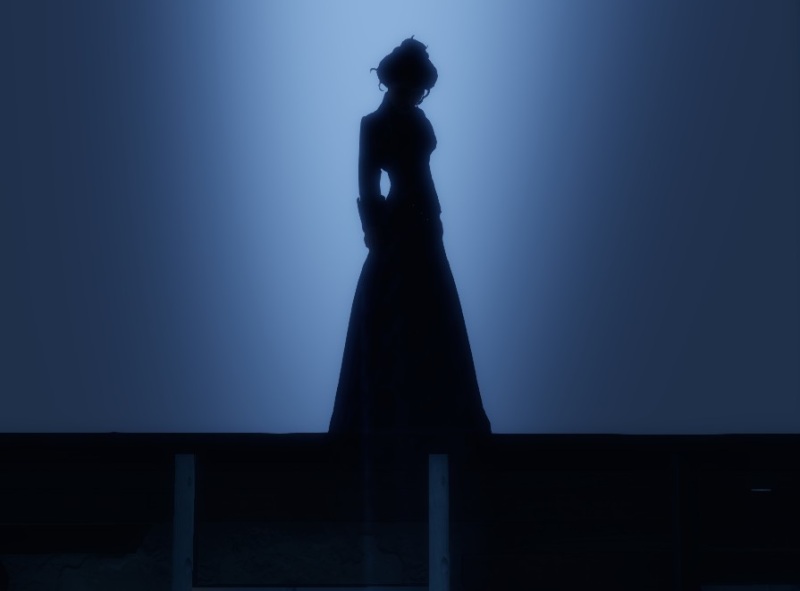
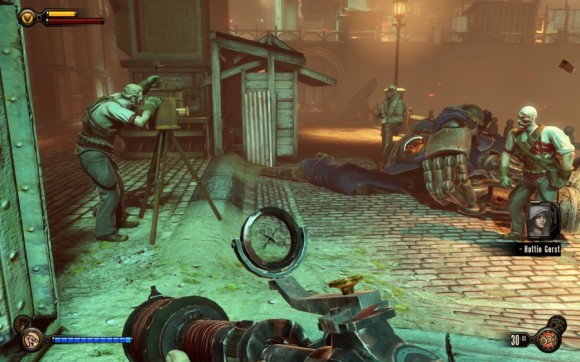
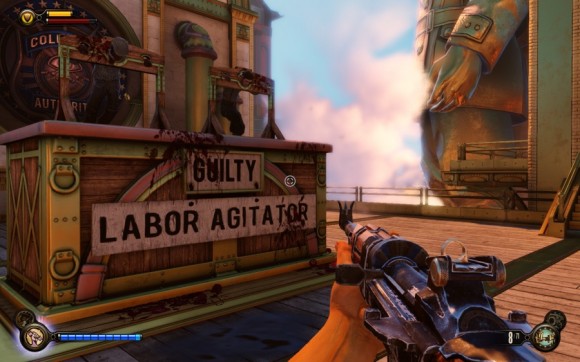
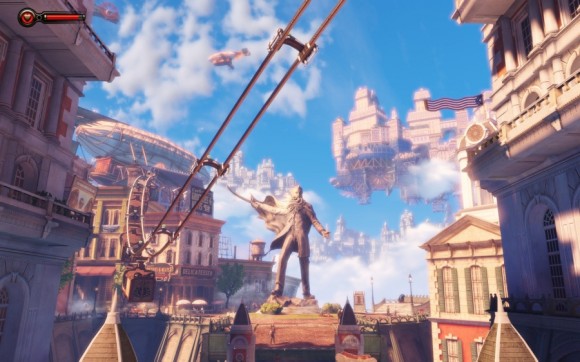
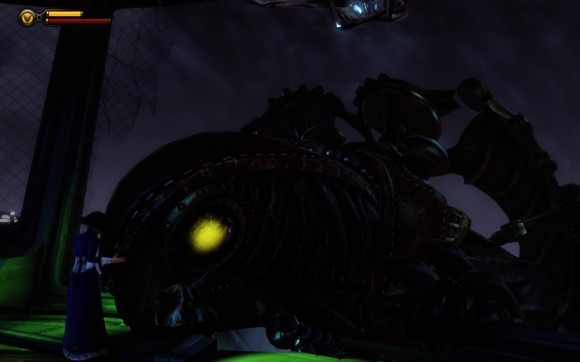
Comments
6 responses to “There is nothing new under the sun: on Bioshock Infinite”
I often am left mostly cold and slightly annoyed by games that everyone else loves. I've never played Bioshock Infinite, but you just roughly described my reaction to the majority of AAA blockbuster supergames and a hefty portion of dull critical darlings.
I don't know if I would describe my response as being left cold; it was more a mix of impressed, bemused and angry depending on what I was experiencing at any given point. Annoyed, sure, and disappointed too. I can't see myself looking back on Infinite with anything like the fondness and respect I have for its predecessors.
At the time I called the combat in Bioshock Infinite as 'frictionless'. It just washed over me as if it hadn't been there.
The story was a bit 'meh' but we really should get that podcast that we recorded out about it.
Yeah… POTTER.
You reflect many of my own feelings here Shaun, namely the character broad strokes, the unbelievable trucker's gear shift in the Vox and Fitzroy (this pissed me off no end), the handymen and firemen difficulty spikes, the incredibly tedious looting, the exposition dump at the end (kthxbye). There was this awful line in there that I think was just there to piss me off where Booker says something like 'the only difference between Comstock and Fitzroy is how you spell the name'. Bah, fuck off. And there's Brink with its morally ambiguous Security and Resistance and an awful lot of people dismissed it.
I said in a private email that I hope this is the game that makes developers say 'Okay, so shooting people in the face for 20 hours probably isn't the best fit for a story driven game focused on big concepts, characters and world building. We need to come up with a better vehicle to carry this type of thing' which loosely ties into what Brainy Gamer said. ABC hit the nail on the head there as well with regards to the nuance. It's just so hamfisted, and yes, I know Bioshock is kind of all about extreme ideals but I had real difficulty buying it this time.
"Bioshock is kind of all about extreme ideals"
The most unfortunate thing of all is that, if it is about this (I'm not sure if it's about it but it certainly tries to engage with it), it's an execrable mishandling of it – ahistorical, apolitical hand-wringing nonsense of the most valueless kind. Which I think is quite splendidly summarised by that ridiculous Comstock/Fitzroy line.